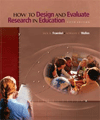Jack R. Fraenkel,
San Francisco State University
Norman E. Wallen,
San Francisco State University
| Categorical variable | Data (variables) that differ only in kind, not in amount or degree.
|
 |
 |
 |
| Constant | A characteristic that has the same value for all individuals.
|
 |
 |
 |
| Dependent variable | A variable affected or expected to be affected by the independent variable; also called "criterion" or "outcome variable."
|
 |
 |
 |
| Directional hypothesis | A relational hypothesis stated in such a manner that a direction, often indicated by "greater than" or "less than," is hypothesized for the results.
|
 |
 |
 |
| Experimental variable | The variable that is manipulated (systematically altered) in an intervention study by the researcher.
|
 |
 |
 |
| Extraneous variable | A variable that makes possible an alternative explanation of results; an uncontrolled variable.
|
 |
 |
 |
| Hypothesis | A tentative, testable assertion regarding the occurrence of certain behaviors, phenomena, or events; a prediction of study outcomes.
|
 |
 |
 |
| Independent variable | A variable that affects (or is presumed to affect) the dependent variable under study and is included in the research design so that its effect can be determined; sometimes called the "experimental" or "treatment" variable.
|
 |
 |
 |
| Manipulated variable | See experimental variable.
|
 |
 |
 |
| Nondirectional hypothesis | A prediction that a relationship exists without specifying its exact nature.
|
 |
 |
 |
| Outcome variable | See dependent variable.
|
 |
 |
 |
| Quantitative variable | A variable that is conceptualized and analyzed as distinct categories, with no continuum implied.
|
 |
 |
 |
| Relationship | A connection between two qualities or characteristics (e.g., motivation and learning).
|
 |
 |
 |
| Treatment variable | see experimental variable.
|
 |
 |
 |
| Variable | A characteristic that can assume any one of several values, for example, cognitive ability, height, aptitude, teaching method.
|



 2003 McGraw-Hill Higher Education
2003 McGraw-Hill Higher Education